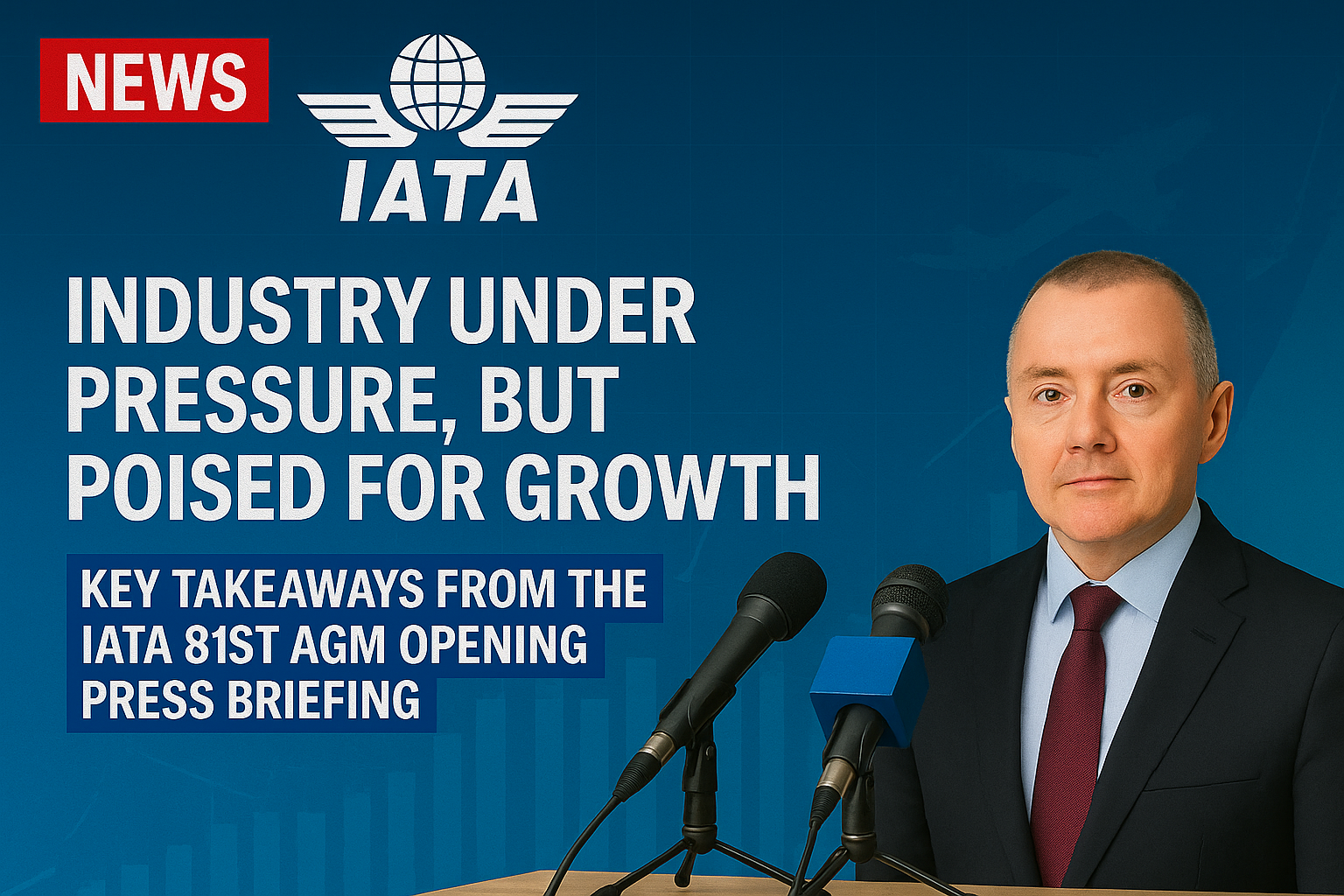The 81st IATA Annual General Meeting and World Air Transport Summit kicked off in Delhi with a high-energy press briefing, featuring IATA Director General Willie Walsh, Board Chair and IndiGo CEO Peter Elbers, and IATA’s Head of Communications Tony Consul. The session offered a sweeping view of the global airline industry — its resilience, challenges, and shifting geopolitical realities — as stakeholders confront tight margins, infrastructure limits, and the urgent push toward sustainability.
Global Outlook: Profits Hold Amidst Softening Demand
Walsh opened with a cautiously optimistic global forecast. Although IATA has revised projected industry revenues downward to $979 billion from over $1 trillion, net profitability remains steady at $36 billion with an industry average margin of 3.7%. The decrease is attributed to slightly softer demand and lower ticket yields, partially offset by falling oil prices.
“This is still a wafer-thin margin,” Walsh emphasized, reinforcing the need for structural reform across regions.
Supply Chain Chaos: Frustration Peaks
A recurring theme throughout the briefing was the ongoing supply chain crisis, particularly delays in aircraft and engine deliveries. Airlines are operating older fleets, with average aircraft age climbing to 15 years, pushing up maintenance costs and turnaround times.
“The most frustrating issue CEOs are dealing with,” Walsh said, citing last-minute notifications from manufacturers about missed deliveries. Legal action remains on the table, but IATA continues to seek collaborative solutions with OEMs.
Sustainability Stalemate: Fragmentation Hurting Progress
On sustainability, Walsh was direct in his criticism of the EU’s SAF mandate, accusing fuel suppliers of exploiting the policy to impose unjustified compliance fees, adding $1 billion in costs without increasing production.
“Mandates are failing,” he argued. “They’ve created windfall profits for fuel suppliers, not environmental benefits.”
He reiterated IATA’s support for CORSIA, the global carbon offset scheme, but stressed that only one country (Guyana) has made eligible carbon credits available so far. “Governments must meet their obligations,” Walsh said, warning that without action, airlines will be unable to meet emissions targets through no fault of their own.
Infrastructure and Capacity: Europe vs. India
The contrast between India’s infrastructure expansion and Europe’s regulatory stagnation was front and center. Elbers praised India’s vision, citing upcoming second airports in Delhi and Mumbai, and a coordinated national approach to aviation as part of broader economic growth.
In stark contrast, Walsh criticized Europe’s airport passenger caps, particularly Dublin’s outdated road-access-based limit, which he described as “total madness.”
Geopolitics and Talent: Enduring Challenges
From Russia-Ukraine and India-Pakistan airspace issues to the rising impact of tariffs and U.S.-China tensions, geopolitics remain a volatile variable. Walsh noted the industry’s resilience and adaptability: “We’re used to this. But it limits route planning and expansion.”
On talent shortages, both leaders pointed to regional variance. Elbers praised India’s deep and ambitious talent pool, while acknowledging that air traffic control shortfalls — particularly in North America and Europe — are impeding efficiency.
Blocked Funds and Market Access
A significant concern raised was blocked airline funds in various markets. “Airlines cannot operate in countries where they cannot repatriate their money,” Walsh stated. While the situation has improved, it remains a critical pressure point — especially in markets with razor-thin margins.
When asked about international market access, Walsh rejected accusations of Indian protectionism, calling the issue a “timing challenge,” while Elbers defended India’s bilateral approach as “fair and balanced,” emphasizing the importance of Indian airlines using their own traffic rights before expanding access to others.
Security in Conflict Zones and ICAO’s Role
Responding to questions on civil aviation in conflict zones, Walsh called for stronger international action and accountability, confirming IATA has raised these concerns with the UN Security Council. He expects the issue to be addressed at the ICAO Assembly in Montreal later this year.
Conclusion: Unity, Urgency, and Opportunity
The press briefing underscored IATA’s central message: while the aviation industry is financially stable for now, systemic vulnerabilities threaten future growth. Walsh concluded with a call for greater policy alignment, pragmatic regulation, and global cooperation.
“If governments, manufacturers, and service providers don’t step up — the industry won’t fail — but its ability to thrive will be seriously constrained,” he said.
As the AGM unfolds, the pressure is on for the global aviation community to move from rhetoric to results.





